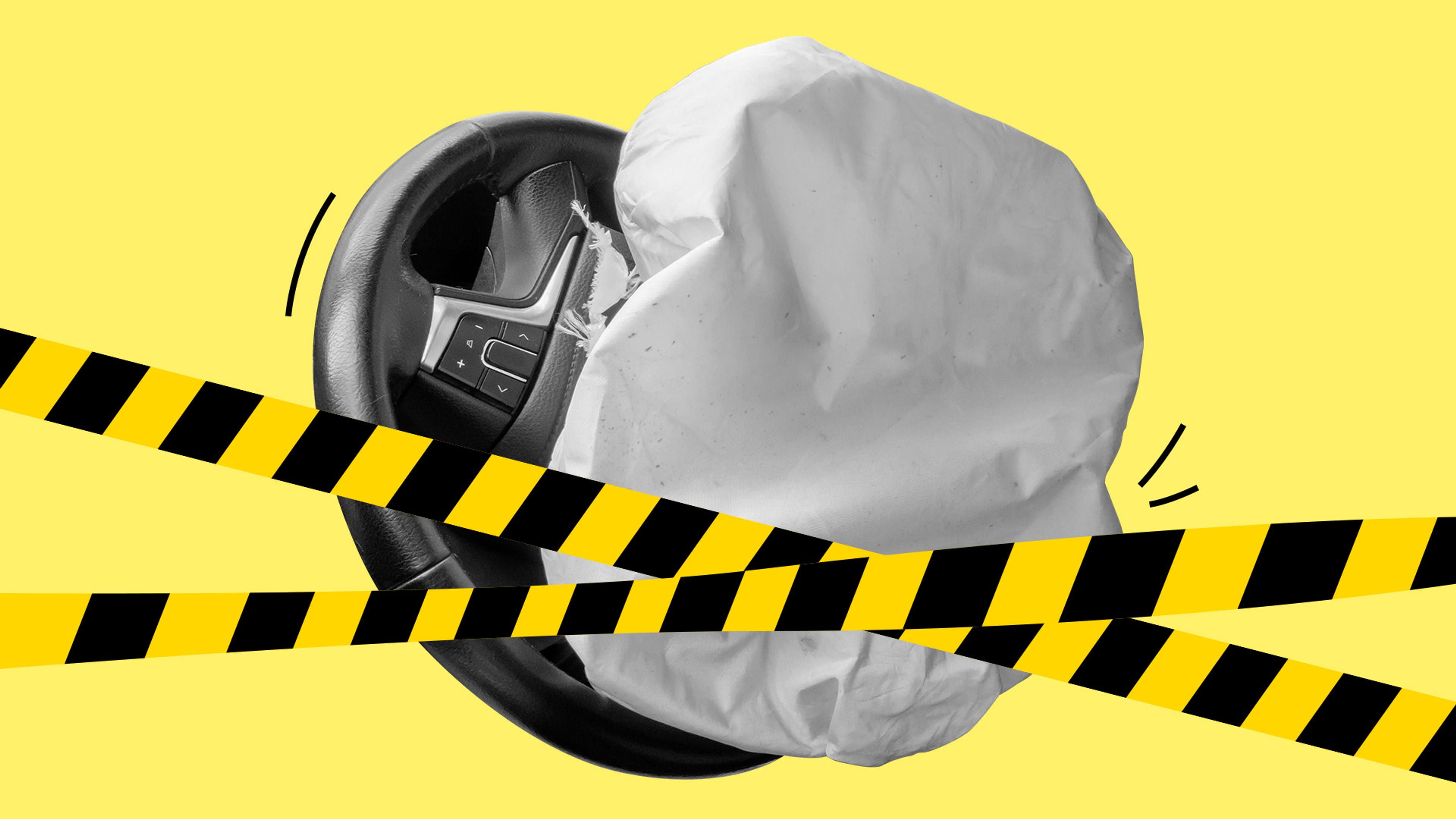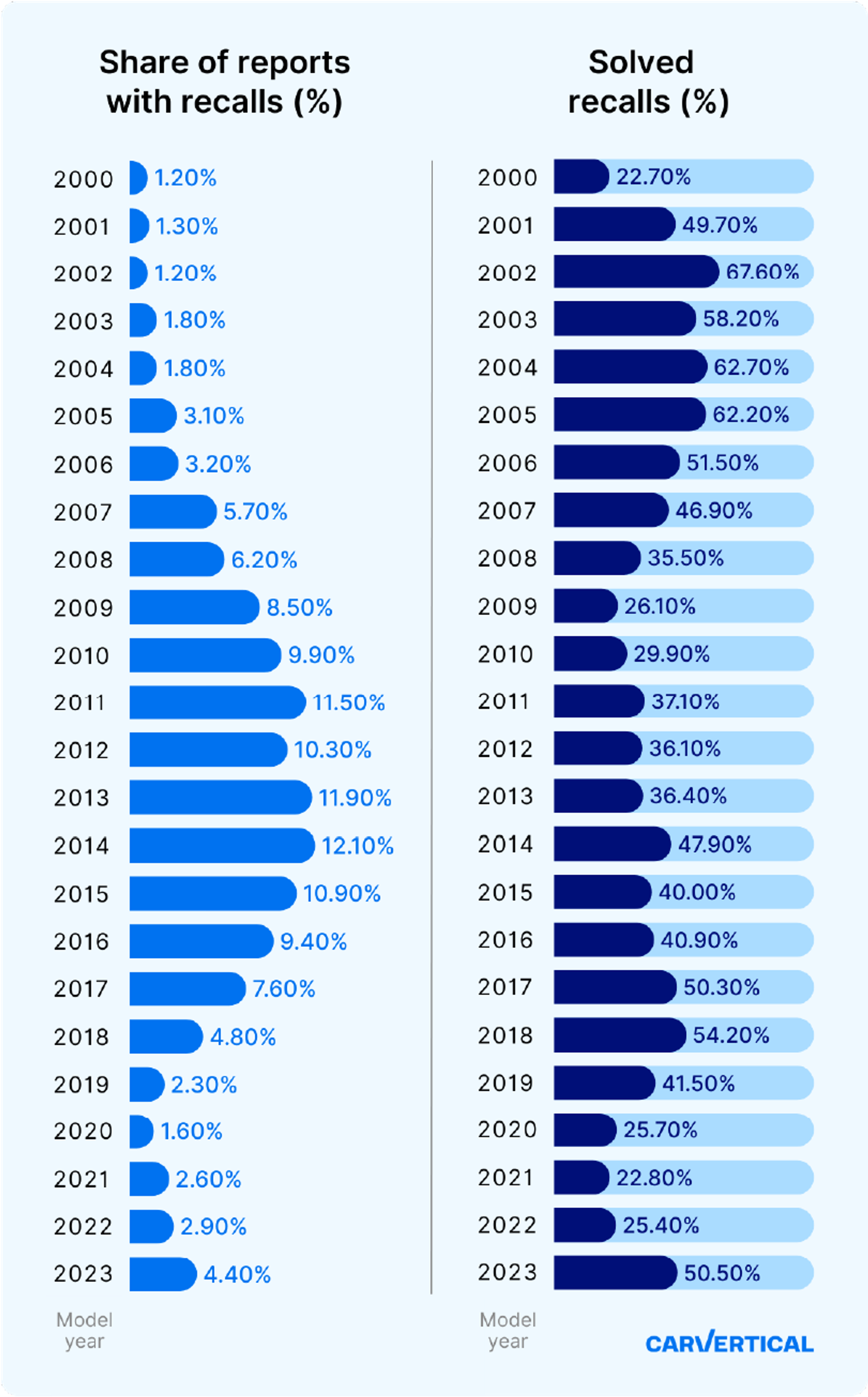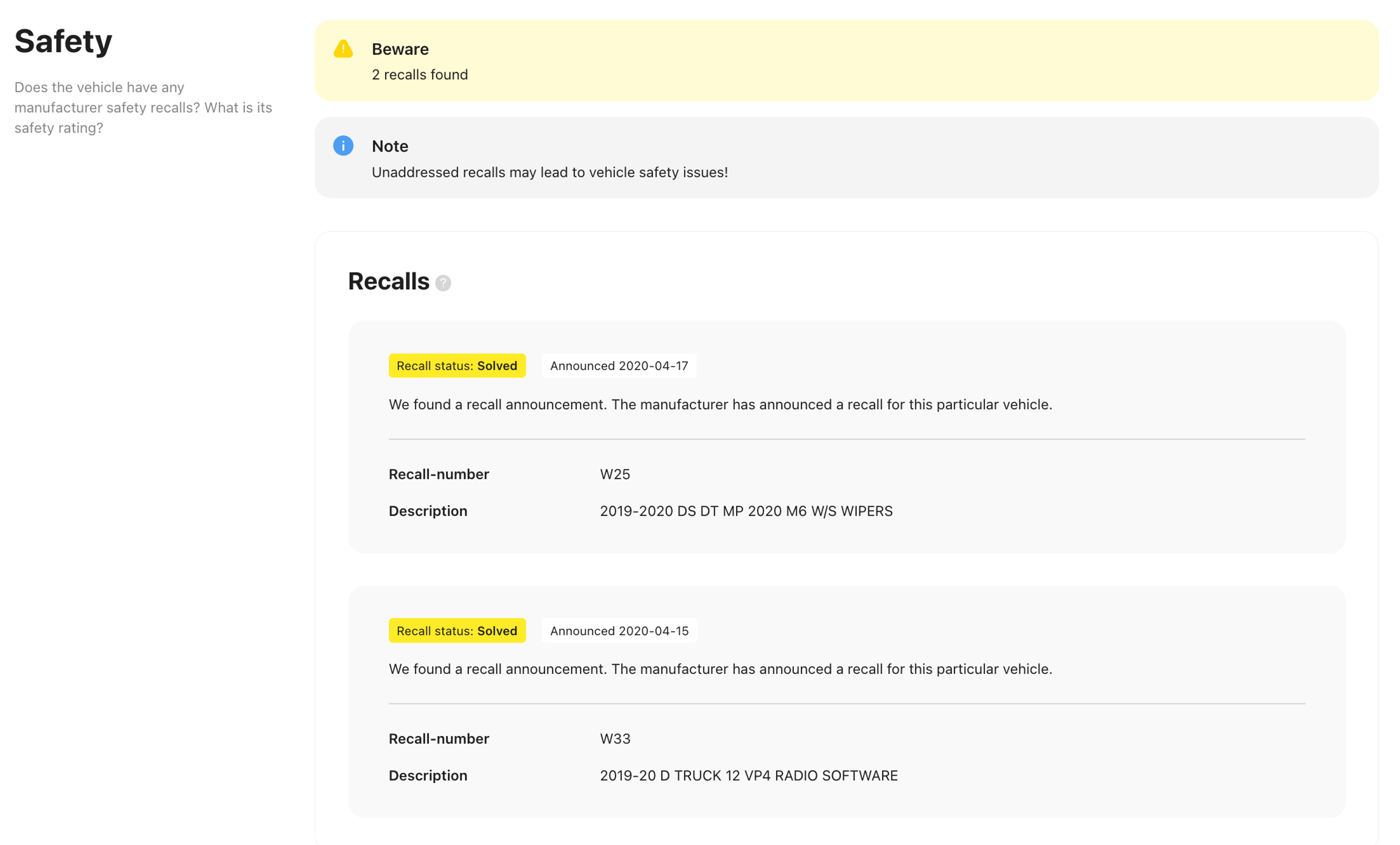09/01/2025
Research: How common are cars with unresolved recalls, and should you ignore them?

Karolis Bareckas

Even brand-new cars rolling out of showrooms can have factory defects that compromise the safety of drivers and passengers. While some issues become apparent over time, manufacturers are legally obligated to recall affected vehicles for repairs.
However, many drivers neglect to address these recalls, leaving lots of vehicles on the road with potentially dangerous manufacturing issues.
Our team conducted a study to determine in which countries buyers face the highest risk of purchasing a used car with an open recall.

Looking for a reliable car?
A well-maintained and undamaged car is the most reliable! Check any VIN code to make sure you're not buying a wreck:
Research findings
- Portugal has the highest share of vehicles with (resolved or unresolved) recalls in the research (18.2%).
- Over half of recalls (50.2%) in Greece had been solved, which is the best result among all countries surveyed.
- The UK and Belgium had the lowest share of vehicles with recalls (both at 3.1%).
- Only 27.2% of recalls were solved in Slovakia – the worst result in the research.
- Southern European countries have the highest percentage of cars with recalls.
- Cars manufactured in 2014 had the most recalls (12.1%).
Why are some cars recalled for repairs?
Recalls are common in the automotive industry, affecting all manufacturers at some point. Airbags, seatbelts, brakes, and electrical systems are the most frequent culprits behind recalls. While most factory defects are minor, some can pose critical safety risks, making it inadvisable to drive the vehicle.
As cars become increasingly modern and incorporate more electrical components and safety technologies, recalls are becoming more common. Fortunately, these issues are usually resolved during regular vehicle maintenance, causing minimal inconvenience to drivers.
Some manufacturing defects, however, can have serious consequences. In 2013, news spread worldwide about defective (and dangerous) airbags produced by the Japanese corporation Takata, which affected millions of vehicles. Automakers such as BMW, Chrysler, Ford, Honda, Mazda, Nissan, and Toyota recalled cars with Takata airbags for repairs. Despite this, there were injuries and even fatalities, and a decade later, vehicles with these faulty airbags can still be found in the used car market.
Airbags, seatbelts, brakes, and electrical systems are the most frequent culprits behind recalls. While most factory defects are minor, some can pose critical safety risks, making it inadvisable to drive the vehicle.
Southern European countries (and Germany) have the highest recall rates
Among the researched countries, Portugal (18.2%) and Greece (17.6%) had the highest share of recalled vehicles, followed by Spain (14.5%), Bulgaria (13.9%), and Germany (11.5%).
The number of cars with resolved recalls varies across these countries. In Portugal, 38% of owners responded to recall notices, compared to 50.2% in Greece, 42.2% in Spain, 42.6% in Bulgaria, and 48.5% in Germany.
In other words, almost half of all drivers in these countries don’t take manufacturing defects seriously and choose to ignore them.
The lowest recall rates were observed in the UK (3.1%), Belgium (3.1%), the US (3.2%), Czechia (4%), and Sweden (4.4%).
Considering the high percentage of unresolved recalls and the increasing complexity of vehicle technology, it’s crucial for consumers to take proactive steps when buying a used car. Otherwise, you can never know whether a manufacturing defect will put your safety at risk.
Beware of 10-year-old cars – they have too many secrets
Approximately 1 out of 8 vehicles built in 2014 have had manufacturing defects.
The chances of stumbling across a vehicle with unresolved recalls highly depend on the year of manufacture.

12.1% of all vehicles manufactured in 2014 and checked on carVertical had recall records – the worst result in the research. This means that approximately 1 out of 8 vehicles built in 2014 have had manufacturing defects. 47.9% of those recalls were solved, leaving over half of cars with open recalls. Many of these cars are likely to have changed several owners without them knowing about an unresolved recall.
2013 was another complicated year for car manufacturers, as 11.9% of vehicles checked on carVertical had recalls (36.4% solved), followed by 2011, with 11.5% of cars having recall records (37.1% solved).
Older cars typically have fewer recalls – 20 years ago vehicles had less electrical systems and various technologies that can fail. Since it takes time for car makers to detect manufacturing defects, evaluate their potential impact on the vehicle’s safety, and issue a recall, newer cars also have fewer recall records compared to 9-13 year old vehicles.
How to avoid cars with unresolved recalls
When buying a used car, it’s essential to check whether the manufacturer issued a recall for that vehicle and, if so, whether the problem was fixed. Ignoring unresolved recalls could compromise your safety and lead to mechanical issues over time.
The easiest way to spot a recall is by employing carVertical’s history report. In the Safety section, you can find information on issued recalls, the date they were announced, their description, and whether they were solved or not.
When buying a used car, it’s essential to check whether the manufacturer issued a recall for that vehicle and, if so, whether the problem was fixed. Ignoring unresolved recalls could compromise your safety and lead to mechanical issues over time.
If the car you want to buy has unresolved recalls, you’ll have additional trouble contacting the manufacturer and bringing your vehicle for repairs. If the recall is minor, such as faulty radio software, you can continue driving such a car. But if the recall was issued for critical parts like airbags, brakes, or the steering system, you shouldn’t risk your safety and get it fixed as soon as possible.
Don’t forget that you can also use this information as a bargaining chip to negotiate a better price with the seller. However, keep in mind that they may be skeptical, as many owners simply have no idea that their car was recalled years ago.


Check your registration number
Avoid costly problems by checking a vehicle's history. Get a report instantly!
Methodology
The carVertical study analyzed vehicle history reports purchased by the company’s users in 26 countries between January 2023 and September 2024 and counted the share of reports containing information about car recalls. The company’s data allows us to identify whether the recall was resolved, unresolved, or if the status of the issue is unknown.

Article by
Karolis Bareckas
Karolis is an automotive writer focusing on the industry part of things. His goal is to educate readers and foster transparency in the used car market. With a passion for storytelling and extensive experience writing in a variety of fields, Karolis enjoys sharing his knowledge and spreading the word about automotive and tech topics. He’s also a a big fan of muscle cars and long road trips.
